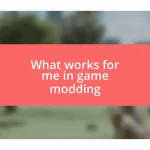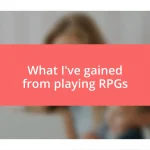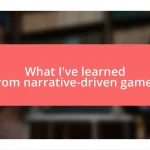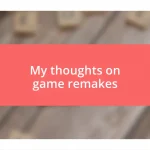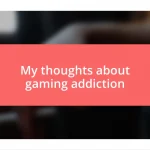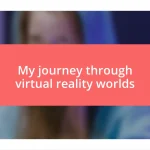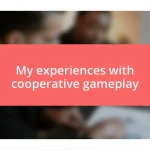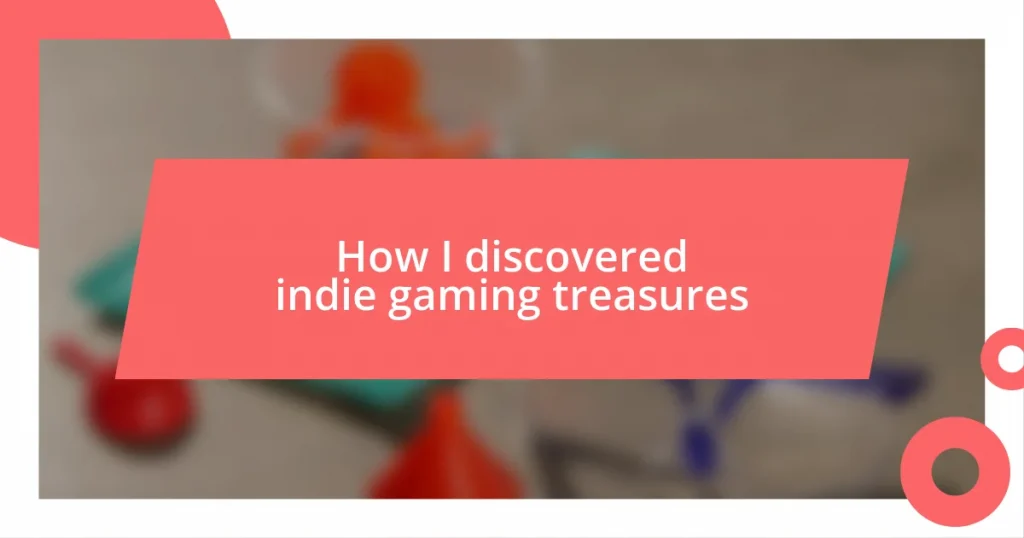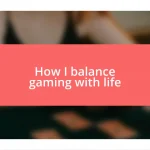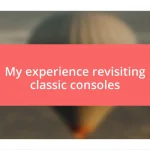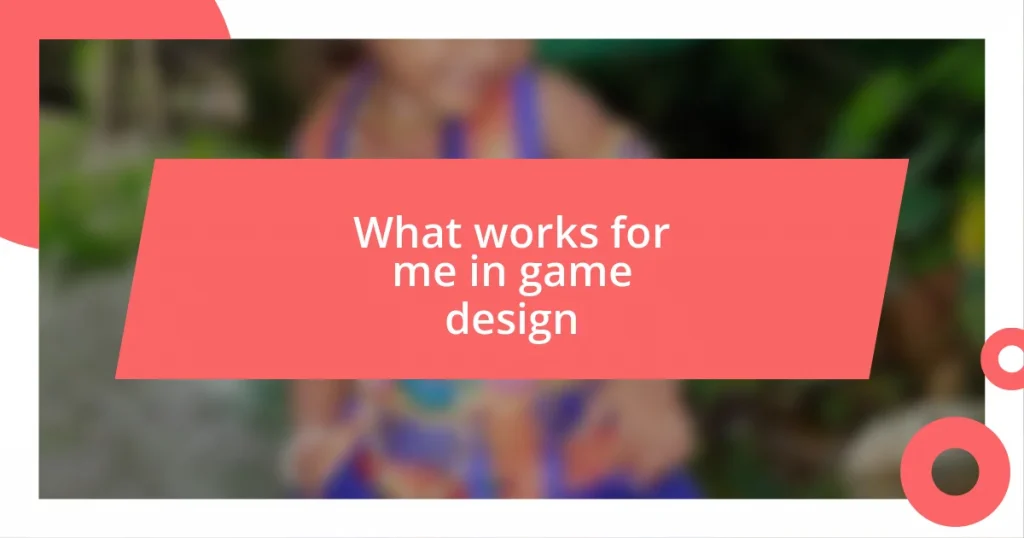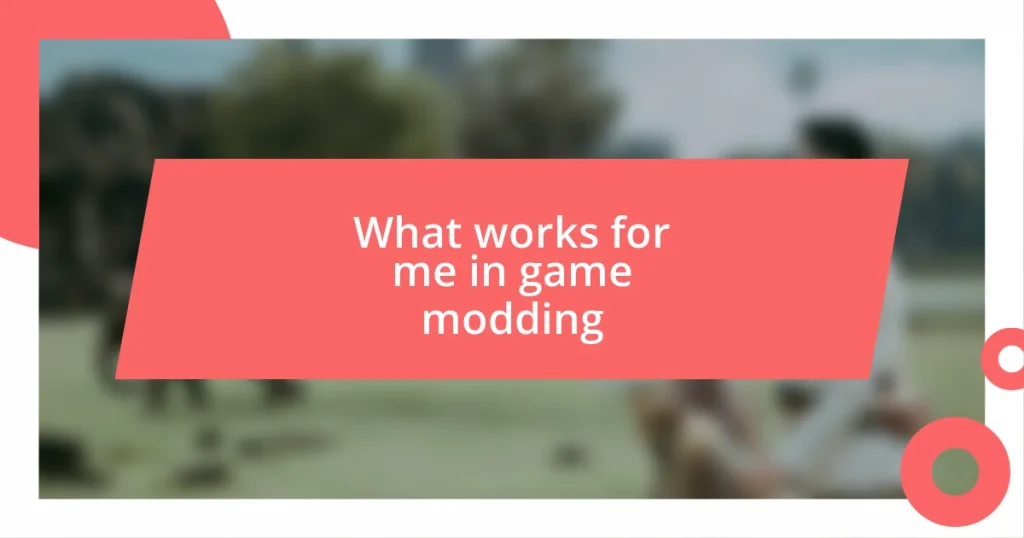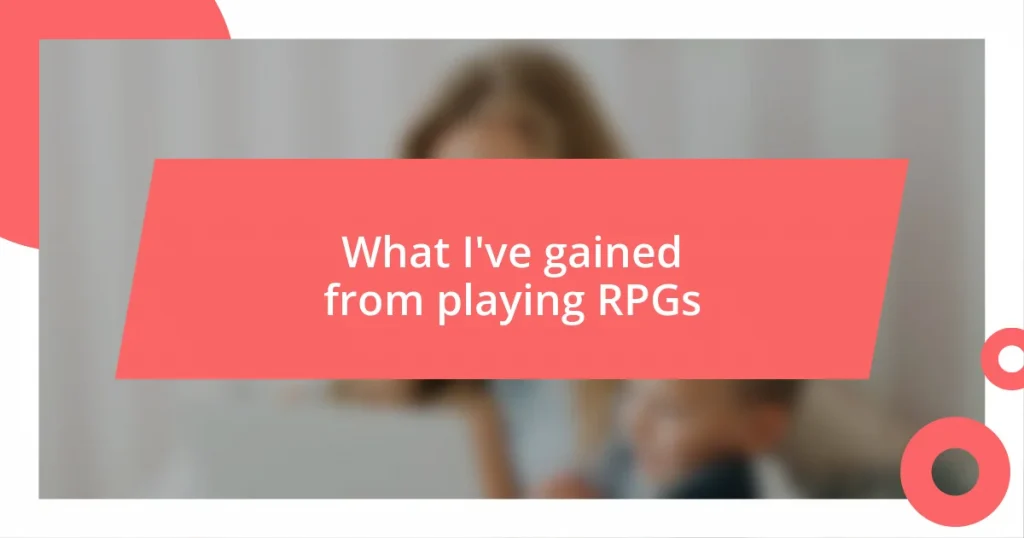Key takeaways:
- The author discovers the emotional depth and unique storytelling of indie games, contrasting them with mainstream titles.
- Engaging with indie gaming communities, attending festivals, and supporting developers enhances the overall experience and connection within the indie gaming world.
- Sharing discoveries online fosters a vibrant community, allowing for meaningful interactions among gamers and developers alike.
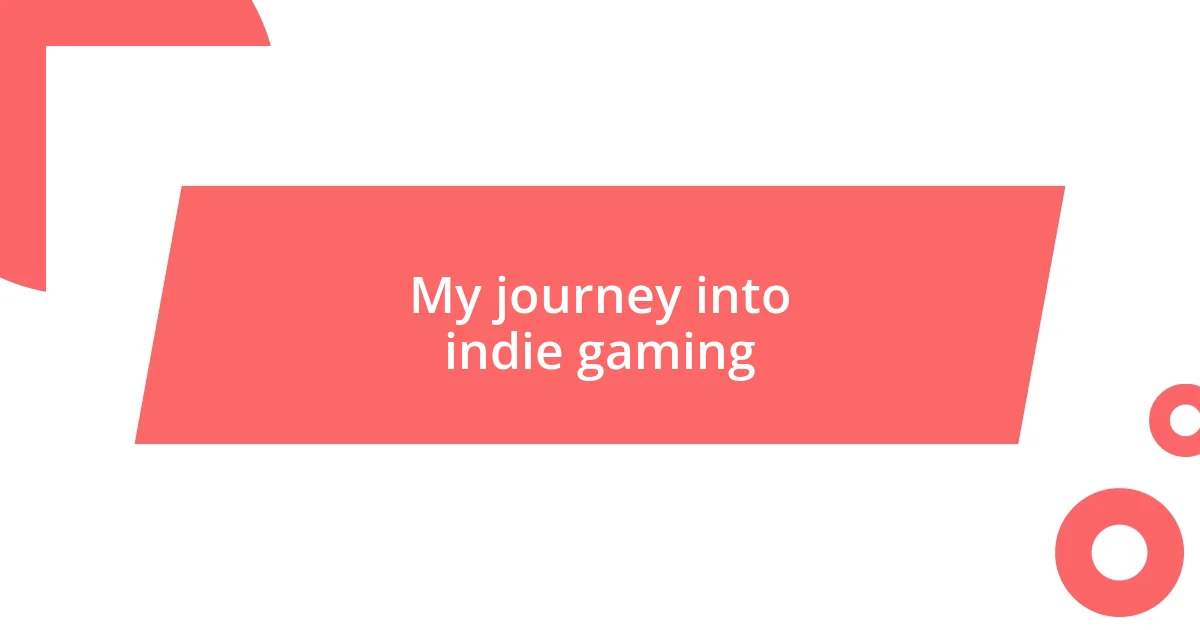
My journey into indie gaming
My journey into indie gaming began quite unexpectedly. One rainy afternoon, searching for something new to play, I stumbled upon a vibrant little title that caught my eye. The art style was so unique, and I thought, “What if this gem has a story that could move me just like blockbuster games usually do?”
As I immersed myself in that enchanting world, I found the narrative and character depth simply mesmerizing. It was a stark contrast to mainstream titles, which sometimes prioritize graphics over storytelling. Each level felt like a carefully crafted piece of art, and I couldn’t help but wonder—how many other indie treasures were waiting to be discovered?
Over time, I built a small community of friends who also shared my passion for indie games. We began meeting regularly to discuss what we had played, and these conversations would often lead us down rabbit holes of exploration. I remember one night, we debated the merits of a quirky platformer, laughing at how it managed to evoke genuine emotion. It made me realize that indie games weren’t just about gameplay; they were about connection—both with the developers and with fellow players.
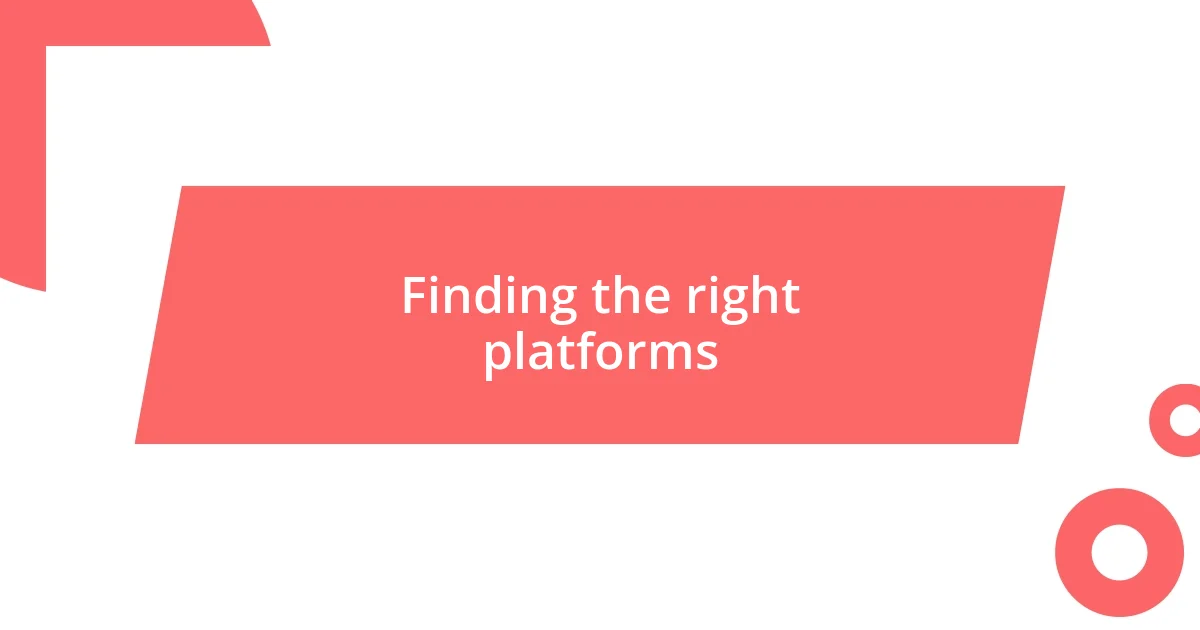
Finding the right platforms
When I first started exploring indie games, I quickly learned that not all platforms are created equal. Some focus on mainstream titles, while others are treasure troves for hidden gems. I found that diving into smaller platforms often led me to discover games I otherwise would have missed. It’s like strolling through a quaint bookstore instead of a massive retailer. Each corner reveals something uniquely enchanting.
Here are a few platforms that have become my go-to sources for indie gaming:
- Steam: A giant in the gaming world, but with a vast indie collection; their seasonal sales are a perfect opportunity to grab hidden gems.
- itch.io: This platform has an eclectic mix of games made by independent developers, often experimental or offbeat.
- Game Jolt: A community-focused site where you can find games in various stages of development, fostering innovation and creativity.
- Humble Bundle: Not only does it offer bundles at great prices, but the charity aspect makes every purchase feel rewarding.
- Epic Games Store: They occasionally highlight indie titles, giving players exclusive access to new releases and hidden treasures.
While exploring these platforms, I recall the thrill of discovering a tiny game about a lost fox navigating an enchanted forest. It was breathtaking—not only in its visuals but also in the deeply resonant themes of loneliness and connection. Finding the right platform isn’t just about accessibility—it’s about uncovering those heartfelt stories that indie developers pour their souls into.
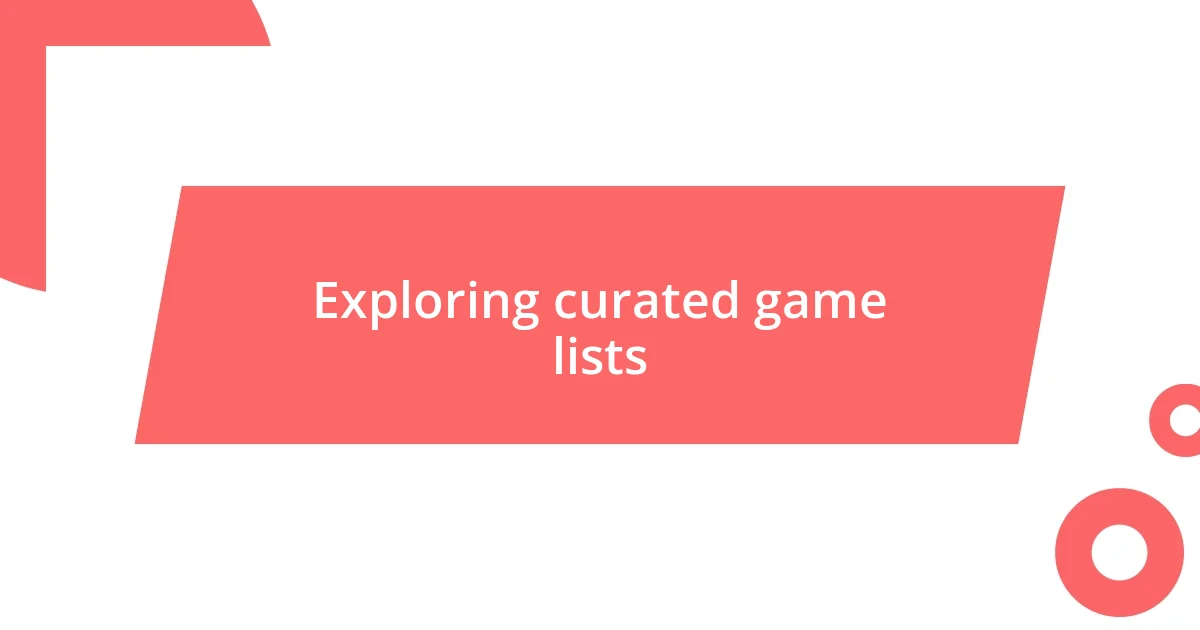
Exploring curated game lists
Exploring curated game lists has been one of my most rewarding quests in the indie gaming world. I often find myself scrolling through these lists, each click revealing a new possibility. Some lists focus on specific genres or themes, and they can be a goldmine for uncovering titles tailored to my tastes. For instance, stumbling upon a list dedicated to narrative-driven games led me to a hauntingly beautiful adventure that still resonates with me today.
I remember a particular week dedicated to playing games from a list titled “Hidden Gems of 2020.” Each game was a delightful surprise, yet one title completely stole my heart. It was a minimalist puzzle game with a gripping story and a soothing soundtrack that lingered long after I closed the game. It’s experiences like these that highlight the significance of curated lists, connecting me to creators who pour so much passion into their work.
The variety in curated lists can be astounding. From games that evoke nostalgia to innovative titles that challenge conventional mechanics, these collections often lead me to unexpected gems. It’s fascinating how a well-constructed list can act as a bridge between diverse storytelling styles and gameplay experiences. For me, it turns every search into a treasure hunt, full of delightful discoveries waiting to be unearthed.
| Curated List Source | Types of Games Featured |
|---|---|
| Steam | Varied genres including RPGs, platformers, and simulators |
| itch.io | Experimental and unconventional indie titles |
| Game Jolt | Up-and-coming games, often in beta |
| Humble Bundle | Bundle-focused collections with a charity aspect |
| Reddit’s Indie Gaming Subreddit | User-generated recommendations across multiple genres |
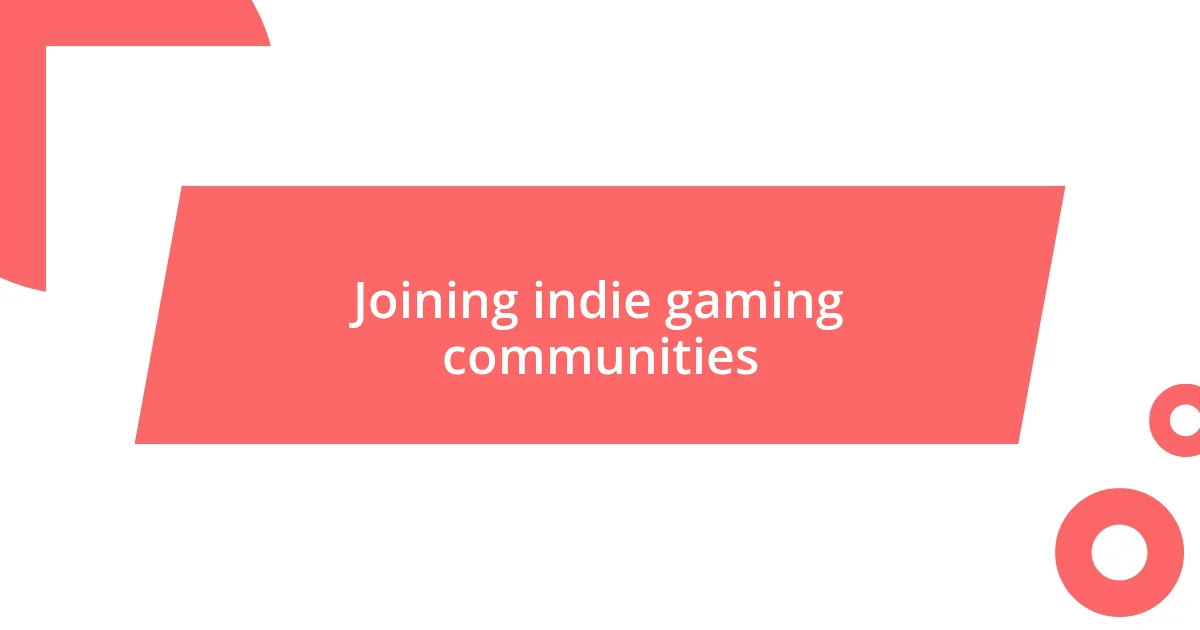
Joining indie gaming communities
Joining indie gaming communities has opened up a whole new world for me. When I first took the plunge, I was amazed at the wealth of passion and creativity just waiting to be tapped into. Many communities are incredibly welcoming, offering both seasoned players and newcomers a space to share experiences and recommend games. Think about it—how often do you get to engage with creators and players who genuinely care about the craft?
One memorable moment for me was the first indie game jam I participated in. I remember feeling nervous but excited as I connected with other passionate gamers and developers. We brainstormed ideas, shared our progress, and offered each other encouragement. The energy was electric! It was a perfect reminder of how collaborative the indie scene can be. Those relationships sparked my interest in games I wouldn’t have noticed otherwise, leading me to titles that really resonated with me emotionally.
What surprised me most about these communities is not only their diversity but their commitment to nurturing creativity. I often find myself discussing how a game’s narrative resonated with me or sharing tips on the best gameplay strategies. It feels like joining a family with a shared love for unique storytelling and artistic expression. Have you ever been part of a community that sparked such joy and curiosity? It’s a warm reminder that in the indie gaming world, we’re all in this together, hunting for the next heartwarming or thought-provoking treasure.
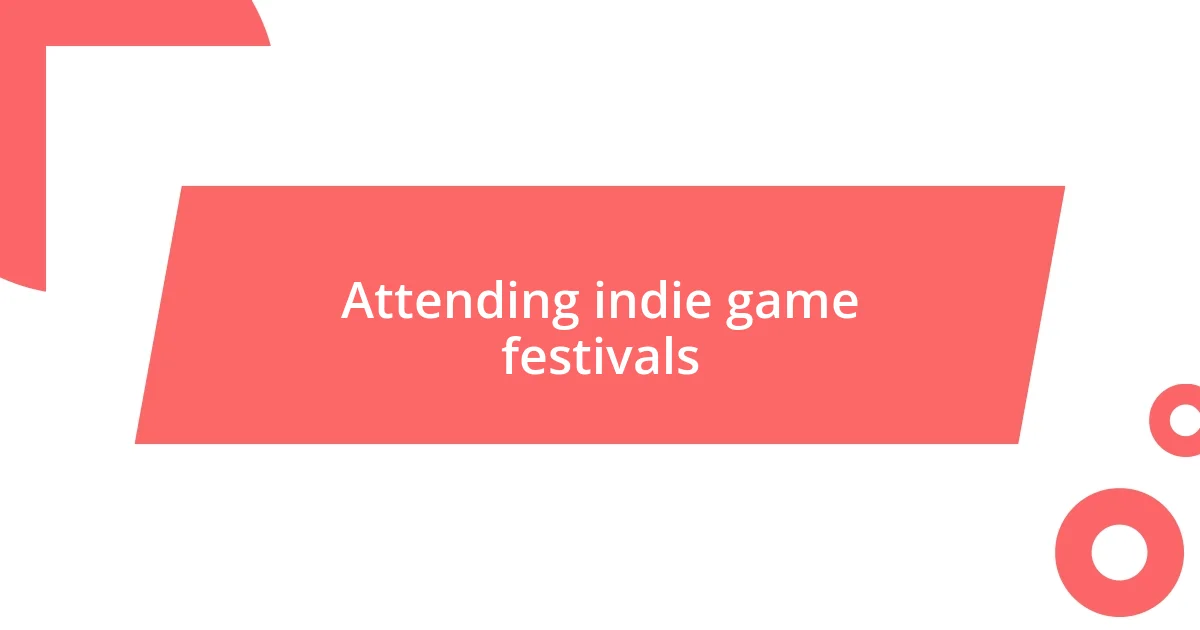
Attending indie game festivals
Attending indie game festivals has been nothing short of transformative for me. I vividly recall my first experience at an indie expo, where the excitement in the air was palpable. Wandering from booth to booth, I discovered innovative titles and met passionate creators eager to share their work. Have you ever felt that rush of excitement when stumbling upon something truly special? That day was filled with those moments for me.
One festival featured a game that caught my eye with its whimsical art style and enchanting soundtrack. As I played, I found myself completely immersed in its world, learning not just about the gameplay but the story behind its creation. Talking with the developer, I felt a genuine connection as they shared the inspiration for their game. Experiences like this remind me how indie games often carry deep personal stories, and it’s thrilling to witness that firsthand.
Additionally, these festivals create a unique atmosphere of collaboration and support. I remember attending a panel discussion with several indie developers who openly shared their journeys. They spoke about their challenges and triumphs in a way that felt both relatable and inspiring. It made me reflect on the shared struggles and joys within the gaming community. How often do we get to hear the raw, honest journey behind the art we love? Moments like these solidify my passion for indie gaming, reinforcing the idea that there are countless treasures waiting to be found, often hidden behind the stories of their creators.
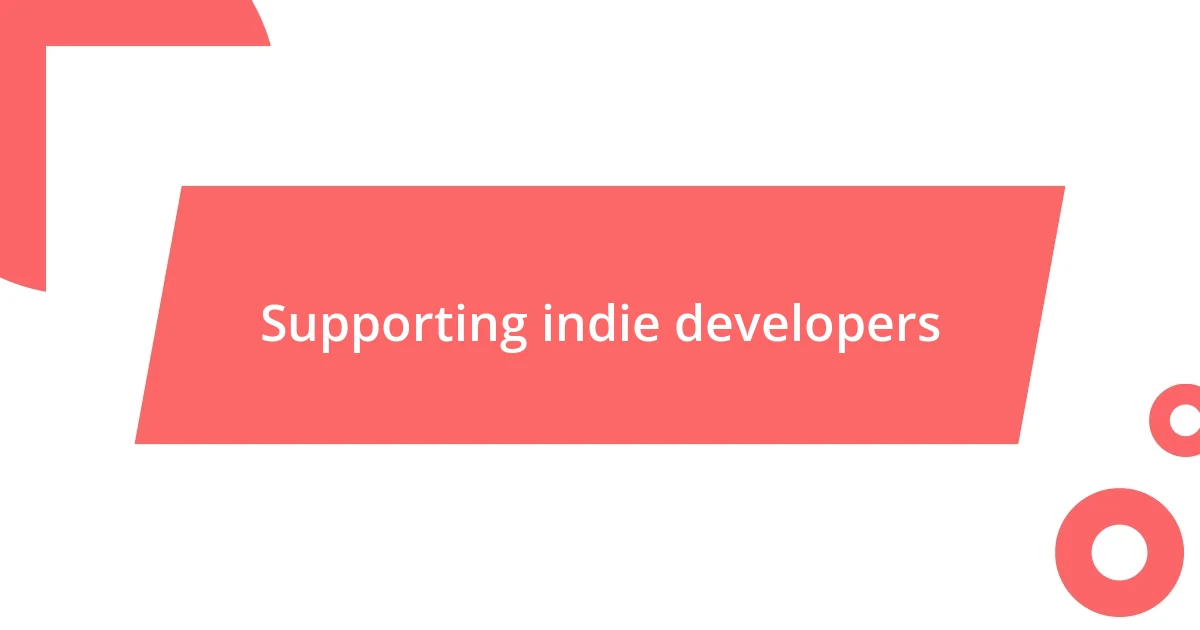
Supporting indie developers
Supporting indie developers means diving into their world and understanding the effort behind each game. I remember a time when I played a beautifully crafted platformer made by a tiny team. I reached out to the developer on social media, sharing how their game made me feel. The joy in their response lingered with me—they were genuinely grateful for my feedback. It’s moments like this that remind me of the impact we can have as players. Have you ever considered how a simple word of encouragement could fuel a developer’s fire to create more?
When I buy an indie game, I know I’m contributing directly to someone’s dream. I still recall purchasing a game that had a unique art style and story. A few weeks later, I received an email from the developer, thanking me for my support and offering behind-the-scenes insights about their next project. That personal touch made me feel part of their journey, creating a bond that goes beyond just playing the game. I often wonder how many developers would share their voices if more players engaged with them.
Moreover, showcasing support for indie developers through social media or streaming platforms can amplify their reach tremendously. I once hosted a small stream dedicated to indie games, and the enthusiasm in the chat was infectious! It felt incredible to spotlight these creators while also introducing viewers to games they hadn’t seen before. Isn’t it amazing how technology can help bridge gaps between developers and audiences, allowing us to connect in meaningful ways? Supporting indie developers isn’t just about buying games; it’s about fostering a community that thrives on creativity and collaboration.
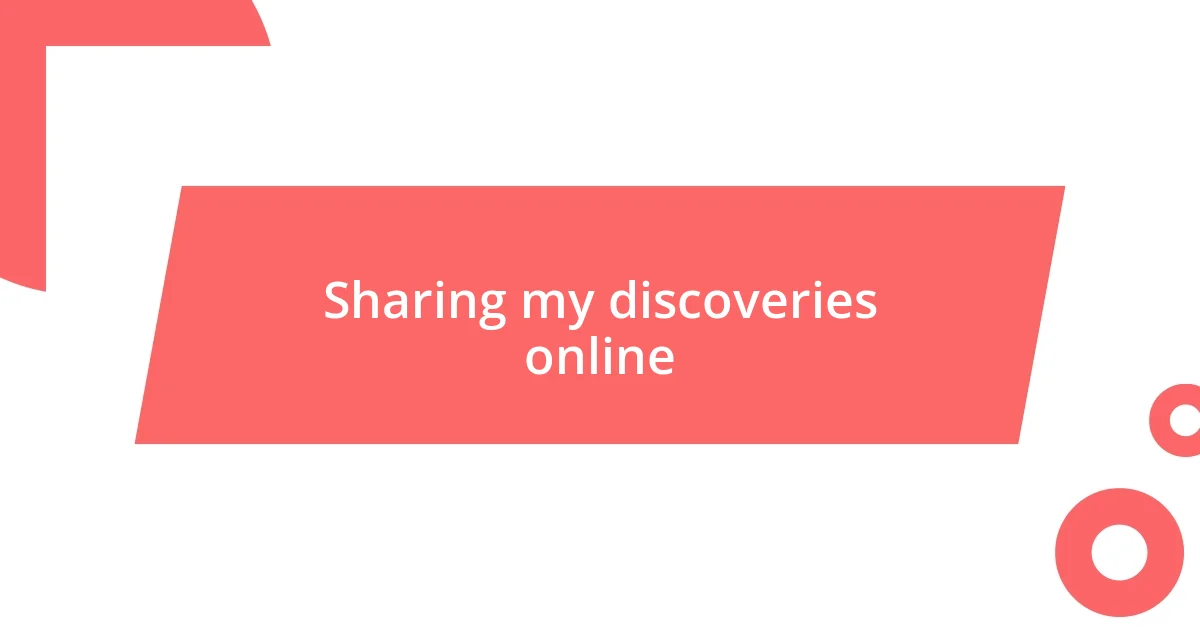
Sharing my discoveries online
Sharing my indie gaming discoveries online has become a passion project of mine. I vividly recall the thrill of posting about a hidden gem I stumbled upon during one late-night gaming session. The comments section exploded with fellow gamers expressing their excitement and sharing their own finds. It was a delightful reminder that these little treasures can spark vibrant conversations, weaving us together through our shared love for indie games.
On a whim, I created a blog to document my journey. One particular entry was about a hauntingly beautiful narrative-driven game that left me pondering long after the credits rolled. The outpouring of appreciation from my readers felt immensely rewarding. I even received messages from indie developers who found their game discovered through my post. Have you ever felt that sense of community when your opinion resonates with others? It’s a humbling experience that reinforces why I love sharing my insights.
I’ve also turned to social media, where I often hold spontaneous game nights with friends and followers. One night, I shared a lesser-known co-op adventure, and the screen lit up with enthusiastic responses. As we played together, I felt a connection forming — not just over the game, but through our collective excitement and laughter. Isn’t it fascinating how sharing our indie game finds can unite people, creating bonds that extend beyond just pixels on a screen? Those moments of shared joy linger with me, reminding me of the incredible community we build through these discoveries.

